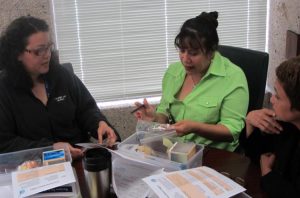NC Initiative to Reduce Home Health Hazards Featured in National Webinar
February 12, 2016
On February 4, Kathleen Gray, Associate Director for Outreach and Public Service in the UNC Institute for the Environment (UNC-IE), and Neasha Graves, Community Outreach and Education Manager in the UNC-IE Environmental Resource Program (ERP), co-presented in a webinar facilitated by the National Institute of Environmental Health Sciences (NIEHS) on healthy homes programming. With nearly 200 participants from the US and Canada, Gray and Graves – along with other presenters from the University of Rochester, Columbia University and WEACT for Environmental Justice –  highlighted the evolution of healthy homes programming in their states and noted opportunities to build on existing partnerships and reduce environmental health hazards in homes.
highlighted the evolution of healthy homes programming in their states and noted opportunities to build on existing partnerships and reduce environmental health hazards in homes.
In their presentation, Gray and Graves specifically touched on the evolution of the North Carolina Lead and Healthy Homes Outreach Task Force, founded as the North Carolina Lead Ad Hoc Committee 27 years ago, and how this longstanding partnership created opportunities among state and local public health and housing professionals to assist families addressing lead, mold, pests and other environmental health hazards in homes. In addition to co-convening the Task Force, along with the NC DHHS Children’s Environmental Health Branch, the ERP also trains public health and housing professionals to identify and remedy home hazards, support lead screening for pregnant women, and develop and share educational resources for varied audiences. Future directions identified by Gray and Graves included improving cultural competency of those leading interventions, sharing resources with tribal nations to address their identified needs related to healthy housing, and seeking funding to sustain healthy homes programs. Support for the work presented in the webinar is provided by the UNC Center for Environmental Health and Susceptibility (NIEHS grant # P30ES010126) and the NC Department of Health and Human Services (CDC grant # UE1EH001276).
